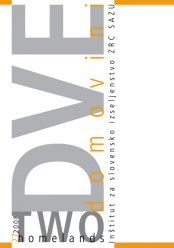Collective Memory of Changing Identities: An Exploration of Memories and Identities Related to the Disintegration of Yugoslavia
Keywords:
social/collective memory, identity, social representations, narratives, disintegration of former YugoslaviaAbstract
Through the analysis of memories of major events related to the disintegration of Yugoslavia the differences in collective memories and social representations of various generations of Slovenians and other former Yugoslav peoples resident in Slovenia are explored. Qualitative analysis of eighteen semi-structured interviews illustrates contested interpretations or narratives of the break up, memories and representations of Tito’s Yugoslavia, and the changes in social (ethnic) identification.
Downloads
References
Bajt, Veronika (2003). From Nation to Statehood: The Emergence of Slovenia. Unpublished Ph.D. Thesis. University of Bristol, UK.
Bašić-Hrvatin, Sandra (1997). The Role of the Media in the Transition. Making a New Nation: The Formation of Slovenia (eds. Danica Fink-Hafner & John R. Robbins). Dartmouth: Aldershot: 267–277.
Bourdieu, Pierre (1999). The weight of the world: social suffering in contemporary society. Cambridge: Polity Press.
Brockmeier, Jens (2002). Remembering and forgetting: Narrative as cultural memory. Culture & Psychology, 8 (1): 15–43.
Bruner, Jerome (1990). Acts of meaning. Cambridge, MA: Harvard University Press.
Deschamps, Jean-Claude (1982). Social identity and relations of power between groups. Social Identity and Intergroup Relations (ed. Henry Tajfel). Cambridge: Cambridge University Press: 83–95.
Duveen, Gerard (2000). Introduction: The Power of Ideas. Social Representations: Explorations in Social Psychology (ed. Serge Moscovici). Cambridge: Polity Press: 1–17.
Duveen, Gerard (2001). Representations, Identities and Resistance. Representations of the Social (eds. Kay Deaux and Gina Philogène). Oxford: Blackwell: 257–270.
Flick, Uwe (1998). The Psychology of the Social. Cambridge: Cambridge University Press.
Flick, Uwe (2002). An Introduction to Qualitative Research. London: Sage.
Halbwachs, Maurice (1992 [1952]). On collective memory. Chicago: University of Chicago Press.
Jovchelovitch, Sandra. (2002). Social representations and narrative: Stories of public life in Brazil. Narrative Approaches in Social Psychology (eds. Janos Lázsló & Walter S. Rogers). Budapest: New Mandate: 47–58.
Jovchelovitch, Sandra & Bauer, Martin (2000). Narrative Interviewing. Qualitative Researching with Text, Image and Sound: A Practical Handbook (eds. Martin Bauer & George Gaskell). London, UK: Sage: 57–74.
Jović, Dejan (2004). ‘Official memories’ in post-authoritarianism: an analytical framework. Journal of Southern Europe and the Balkans, 6 (2): 97–108.
Judah, Timothy (1998). The Serbs: History, Myth and the Destruction of Yugoslavia. New Haven: Yale University Press.
Kansteinter, Wolfgang (2002). Finding Meaning in Memory: a methodological critique of collective memory. History and Theory, 41: 179–197.
Mayring, Phillip (2004). Qualitative content analysis. A Companion to Qualitative Research (eds. Uwe Flick, Eric von Karldorff, & Ingrid Steinke). London: Sage, 114–223.
Middleton, David & Edwards, Derek (1990). Collective Remembering. London: Sage.
Mishler, Elliot G. (1986). Research Interviewing: Context and Narrative. Cambridge, MA: Harvard University Press.
Moscovici, Serge (1973). Foreword. Health and Illness (ed. Claudine Herzlich). London: Academic Press: 1–25.
Moscovici, Serge (2000). Social representations: Explorations in Social Psychology (ed. Gerard Duveen). New York: NY University Press.
Paez, Dario, Basabe, Nekane & Gonzales, Jose-Luis (1997). A cross-cultural approach to remembering. Collective memory of political events: Social psychological perspectives (eds. James W. Pennebaker, Dario Paez, & Bernard Rime). Hillsdale, NJ: Lawrence Erlbaum Associates: 147–174.
Pušnik, Maruša (1999). Konstrukcija slovenske nacije skozi medijsko naracijo. Teorija in Praksa, 36(5): 796–808.
Pušnik, Maruša (2003). Državotvorje, politike reprezentacij in nacionalne mitologije: mediji in iznajdba slovenskosti. Raziskovalno delo podiplomskih študentov v Sloveniji - ena znanost: e-zbornik (ed. Marta Klanjšek). Ljubljana: Društvo mladih raziskovalcev Slovenije: 296–307.
Pušnik, Maruša (2004). Novičarsko upravljanje z javnim mnenjem. Teorije in Praksa, 41(3/4): 678–689.
Ricoeur, Paul (1985). Time and Narrative. Chicago: University of Chicago Press.
Schwartz, Barry (1982). The Social Context of Commemoration: A Study in Collective Memory. Social Forces, 61(2): 374–402.
Sekulić, Duško, Massey, Garth & Hodson, Randy (1994). Who Were the Yugoslavs?. American Sociological Review, 59(1): 83–97.
Strauss, Anselm (1987). Qualitative analysis for social scientists. Cambridge, UK: Cambridge University Press.
Strauss, Anselm & Corbin, Juliet (1994). Grounded Theory Methodology: An overview. Handbook of Qualitative Research (eds. Norman K. Denzin & Yvonna S. Lincoln). London, UK: Sage: 273–285.
Wertsch, James (2002). Voices of Collective Remembering. Cambridge, UK: Cambridge University Press.
Downloads
Published
How to Cite
Issue
Section
License

This work is licensed under a Creative Commons Attribution-NonCommercial-NoDerivatives 4.0 International License.
Authors guarantee that the work is their own original creation and does not infringe any statutory or common-law copyright or any proprietary right of any third party. In case of claims by third parties, authors commit their self to defend the interests of the publisher, and shall cover any potential costs.
More in: Submission chapter





